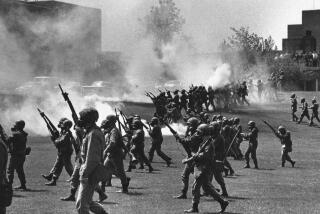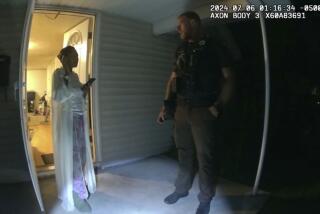The pain of being right
Bailey, Colo. — HE knows he was right.
Sheriff Fred Wegener has reviewed every angle of his decision on that September afternoon seven months ago. A gunman was holding two girls hostage in a classroom at Platte Canyon High School. His last message to negotiators had been: This will be all over at 4 p.m.
It was 3:36. Wegener sent in the SWAT team.
As officers detonated explosive charges to break through the locked door, the gunman killed 16-year-old Emily Keyes.
Veteran police officers backed up Wegener’s decision. Parents in this rural mountain town told him he made the right call. He’s received hundreds of supportive letters from strangers nationwide.
The ones he’s memorized, though, are the two that stung.
“You must be a coward. How do you cash your paycheck?” he recites, his voice flat. “You should have gone in sooner.”
The other e-mail chided him for impatience, for provoking a gunman who had only discharged his weapon once, into a wall:
“I would much rather have a raped daughter than a dead one.”
*
Wegener, 44, is on the phone in his tiny box of an office in the Bailey substation. He’s a tall, muscular man with a bristly flattop haircut -- imposing, but in a friendly way -- and he seems to take up the whole room.
“From what I hear,” he’s saying, “from the information they had, they thought it was a simple domestic. They thought the guy had left.”
Wegener is talking to a friend who has written about the 2004 school siege in Beslan, Russia. They’re comparing notes about the law enforcement response to the horror at Virginia Tech last week.
Police there initially came under heavy criticism for concluding that an early-morning double homicide in a dorm was a domestic dispute. They did not cancel classes or issue a campus-wide alert; instead, they went looking for the boyfriend of one of the victims. They were still questioning him two hours later when Seung-hui Cho, 23, opened fire in Norris Hall, killing 30, then himself. The governor has appointed a panel to investigate.
Talking loudly, nodding vigorously, Wegener paces in front of his desk. He’s reluctant to criticize Virginia law enforcement, he tells his friend. He doesn’t have the facts. None of us does. We don’t know what evidence the police considered; we don’t know what went into their decision.
Only someone who has been there can imagine what those officers are going through now.
In the hours after the siege at Platte Canyon High, the sheriff struggled not to blame himself.
Addressing reporters late that afternoon, his voice shook. Someone asked whether he was second-guessing his decision.
“Yes,” he said softly. “Of course.”
That was the beginning of what Wegener calls his period of “doubtingness” -- just a couple of days, but hard ones. His mind kept circling back.
The first call about a gunman in the high school came at 11:36 a.m. on Sept. 27. At the scene within minutes, Wegener began escorting students to safety. He still sees their faces before him, pale and absolutely still.
He didn’t spot his son, Ben, a junior, but he doesn’t remember looking for Ben in particular. Wegener calls play-by-play for Huskies football. He has chaperoned middle-school dances, called balls and strikes for Little League. These were all his kids.
The gunman, later identified as a 53-year-old loner named Duane R. Morrison, had stormed into an English class, ordered out the boys and the teacher and locked himself in with seven girls. On a table, he had set down a camouflage backpack that he said contained enough explosives to flatten the school. His only demand was that police leave him alone.
Over the next two hours, Morrison released five of his hostages, one by one. At first, he talked to negotiators, but later fell silent inside Room 206. Each girl he released gave investigators the same account: Morrison was taking them aside in the darkened room and sexually assaulting them at gunpoint.
As he grabbed each student in turn, the others stood as ordered, facing the blackboard, listening to the sobs.
“He was hurting my girls,” the sheriff said.
Later, Wegener learned two facts:
There were no explosives in the backpack.
Also, Morrison was impotent. He couldn’t have raped the girls. He had loaded his backpack with tools for violent sexual assault, including handcuffs, knives, rope, duct tape, massage oil and a vibrator. He never opened the pack, though; he left it on a table and warned the girls not to touch it.
“All he could do was what he did do, which was groping. Not that I’m trying to minimize that,” Wegener says. “It’s bad enough.”
Facts in hand, Wegener ran through the day again.
His conclusion: “There was no other possibility” but to confront the gunman with force. He could not have chanced waiting to see what 4 p.m. might bring. One hostage was able to run to safety as the SWAT team burst in. But Morrison had Emily in a chokehold. He shot her in the head, through his own hand, then killed himself.
Another conclusion: “When you’re elected sheriff, people trust you’re going to take care of their families. Somebody in my community died. And I didn’t prevent it.”
*
FOR a time, Wegener couldn’t bring himself to drive past the school. “That passed,” he says. “Life goes on.” He takes shifts as a campus monitor now with the volunteer group Parents at the Door.
Platte Canyon is largely back to normal: Student presentations on the digestive system line a glass display case, and construction-paper posters, in crooked handwriting, announce a basketball game. Room 206, however, is shuttered. The numbers have been peeled off the plaque by the door.
The room won’t be used again for years, Wegener says: “We want to give all the kids who have an association with it a chance to graduate.”
Unlike the teenagers, Wegener won’t move on. His home is here, in this old-time town where the fishing-gear store doubles as an espresso stand and the ragtag patch of a community park is tucked behind Bailey Guns, Bailey Liquors, Bailey Propane and Bailey’s Bar & Grill.
Wegener grew up among the trout ponds and pine trees of this well-off community of 10,000, which sits at the edge of Pike National Forest, about an hour’s winding drive southwest of Denver. He graduated from Platte Canyon High School in 1981, spent six years in the Air Force, then returned home as a sheriff’s deputy -- a job that includes the odd shift shooing bighorn sheep off the two-lane highway. He and his wife of nearly 20 years, June, have two children: Ben, and Dani, a college freshman.
Wegener’s territory, Park County, is vast -- as big as the state of Delaware -- but sparsely populated, with only about 17,000 residents.
The sheriff doesn’t know everyone, but nearly so. The envelope tucked into the sun visor in his cruiser is the bill for medical treatment administered to a young man in custody. Normally, Wegener pays such bills, then seeks restitution. “But I know his mother,” he says, “so I figured I’d just drop it by and see if she can put it on her insurance.”
Wegener might be able to bury his memories of the siege in the steady stream of work -- domestic violence calls, speeding drivers, neighborhood spats.
But he copes best by remembering. With a silver angel charm in his pocket, in memory of Emily, he’s traveled to Washington, D.C.; Kansas; Nebraska and Louisiana to talk about school safety, to share what happened that afternoon at Platte Canyon High.
“That’s the therapy I need,” Wegener says.
He’s been helped, also, by community support. Last fall, Wegener was elected to his third term by an overwhelming majority. Emily’s parents were among his most vocal supporters.
“There is no question in my mind that the actions that were taken were completely appropriate,” says Emily’s dad, John-Michael Keyes. “There was someone in there hurting little girls. We needed to get this thing stopped. If I had been the one making the decision, it would have been the same.”
*
BEFORE she died, Emily text-messaged her parents from captivity: “I love u guys.” A foundation with that name set up by Emily’s friends has raised more than $60,000.
Pink bows commemorating Emily still flutter from trees and signposts throughout town. In the high school parking lot, “I (heart)You Emily!” is scrawled on the window of a pickup truck.
Making a circuit around town late last week, Wegener drives slowly past these reminders. He finds comfort in them, he says. He likes to see that Emily’s life is being honored.
Back in the fourth and fifth grade, Emily had a crush on his son Ben. Or maybe it was the other way around. In any case, the children played together often. Emily loved music and animals and the color pink. She had shoulder-length brown hair, sparkling eyes, a twin brother named Casey.
When Wegener made the decision to storm Room 206, he knew Emily was one of the two remaining hostages. He did not let himself consider that.
“You try to push back personal emotions,” he says. “It’s what just had to be done.”
Wegener stops his patrol car by a gas station with a plywood sign tacked up out front. “In Loving Memory,” it reads.
The sheriff doesn’t say anything, just looks for a moment. Then he swings his cruiser back onto the road.
*
More to Read
Sign up for Essential California
The most important California stories and recommendations in your inbox every morning.
You may occasionally receive promotional content from the Los Angeles Times.










